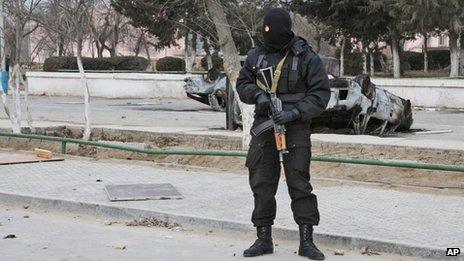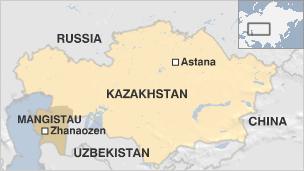Kazakhstan president extends Zhanaozen town emergency
- Published

President Nazarbayev is keen to maintain his country's reputation as a bastion of stability in central Asia
Kazakhstan has extended a state of emergency in the Caspian Sea town of Zhanaozen, President Nursultan Nazarbayev has announced.
Sixteen people were killed last month in the town during clashes between striking oil workers and police.
A criminal inquiry has opened into the use of weapons by the security forces. The violence was the worst since Kazakhstan's independence 20 years ago.
Witnesses said police fired indiscriminately at unarmed workers.
Oil workers have been protesting for months in Zhanaozen, a town of about 90,000 people.
Police say they were forced to defend themselves during the clashes.
Bastion of stability
"I resolve to extend the state of emergency in the town of Zhanaozen in the Mangistau region... until 7 am on 31 January," President Nazarbayev said in a decree posted on his official website.

The president did not give a reason for the extension, which bans all protests and strikes, imposes a curfew and requires checks on transport leaving and entering the town.
It also allows officials to restrict or ban the use of television and radio broadcasting equipment.
December's clashes came after months of strikes in Kazakhstan's energy-rich Caspian Sea region. They coincided with the 20th anniversary of the country's independence and were the most violent in its post-Soviet history.
The criminal inquiry was announced following the appearance of video footage on the internet appearing to show security forces beating and shooting people.
The move marked the first time since the incident that Kazakh prosecutors had accused the police of firing on the protesters. Last month Kazakhstan asked the UN to help investigate the violence.
Eighteen people accused of taking part in the disturbances and looting have been arrested.
President Nazarbayev fired his son-in-law, Timur Kulibayev, from his position as head of Kazakhstan's sovereign wealth fund, which holds stakes in the companies whose workers were striking.
Correspondents say Mr Nazarbayev is keen to maintain his country's reputation as a bastion of stability in central Asia.
The 71-year-old leader has led Kazakhstan since the Soviet era, achieving stability and strong economic growth, but tightly suppressing opposition to his rule.
Officially titled the Leader of the Nation, Mr Nazarbayev won a presidential election in April last year with 95.5% of the vote.
Kazakhstan has huge energy reserves that are attractive to neighbouring energy-hungry China as well as to the West, which is keen to reduce Europe's dependence on Russia's hydrocarbons.
- Published29 December 2011
- Published22 December 2011
- Published17 December 2011
- Published26 October 2011